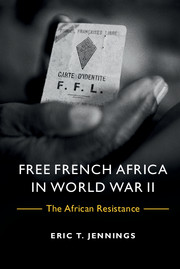Book contents
- Frontmatter
- Contents
- Figures
- Maps
- Acknowledgments
- Archival Abbreviations
- Glossary
- Introduction
- PART I FREE FRANCE'S AFRICAN GAMBIT
- PART II THE WAR
- PART III RESOURCE EXTRACTION, WARTIME ABUSES, AND AFRICAN EXPERIENCES
- Introduction to Part III
- 6 Rubber, Gold, and the Battle for Resources
- 7 Colonial Practices and Wartime Imperatives
- Epilogue
- Conclusion
- Bibliography
- Index
Introduction to Part III
from PART III - RESOURCE EXTRACTION, WARTIME ABUSES, AND AFRICAN EXPERIENCES
Published online by Cambridge University Press: 05 August 2015
- Frontmatter
- Contents
- Figures
- Maps
- Acknowledgments
- Archival Abbreviations
- Glossary
- Introduction
- PART I FREE FRANCE'S AFRICAN GAMBIT
- PART II THE WAR
- PART III RESOURCE EXTRACTION, WARTIME ABUSES, AND AFRICAN EXPERIENCES
- Introduction to Part III
- 6 Rubber, Gold, and the Battle for Resources
- 7 Colonial Practices and Wartime Imperatives
- Epilogue
- Conclusion
- Bibliography
- Index
Summary
The mobilization of resources constitutes a crucial dimension of World War II. It is well established, for instance, that Nazi Germany's prodigious war effort suffered from two major shortages in oil and rubber. Like Germany and Japan, the Allies undertook a frenetic quest for raw materials. It soon encompassed Free France's colonial holdings. British and American experts prospected widely in FEA and Cameroon in search of rubber and rutile, a mineral containing titanium dioxide, used in the armament sector. The U.S. consul in Brazzaville relayed every new lead he could to Washington: rumors of oil deposits off Gabon's shores, the discovery of molybdenite in Cameroon, and so on. In the last case, he even enclosed samples. Rarely had diplomatic bags weighed so much.
FEA and Cameroon's rallying Free France in August 1940 ushered in profound economic transformations. The territories “had to turn unexpectedly towards an allied market that was also global,” noted a 1944 report. It added, “Up until then they had lived in the metropole's orbit and their economies had moved in sync with the motherland's. Their economies were radically different from those of English-speaking lands and the abrupt shift from one to the other presented grave dangers.”
Two Franco-British agreements sealed this new state of affairs. One dated May 20, 1941, concerned FEA. The other, ratified on January 21, 1941, involved Cameroon. The original agreement for FEA guaranteed that the British would purchase Free French cotton (20,000 tons), rubber (1,000 tons), as well as wax, copal, nut and palm oil, peanuts, and lumber. For its part, Great Britain agreed to supply FEA in finished goods. The agreement for Cameroon featured special clauses concerning timber, bananas, and coffee. Beyond these agreements, the British did not hesitate to formulate additional requests to Free French authorities, to obtain lead, wax, tin, palm oil, antelope skins, and logs chosen to meet the specific dimensions set by the British admiralty.
- Type
- Chapter
- Information
- Free French Africa in World War IIThe African Resistance, pp. 175 - 178Publisher: Cambridge University PressPrint publication year: 2015



